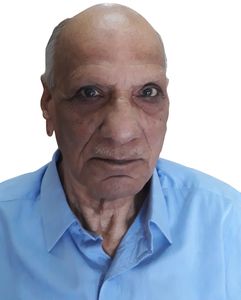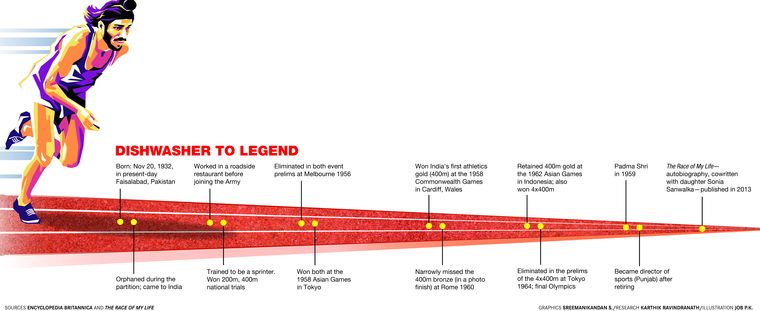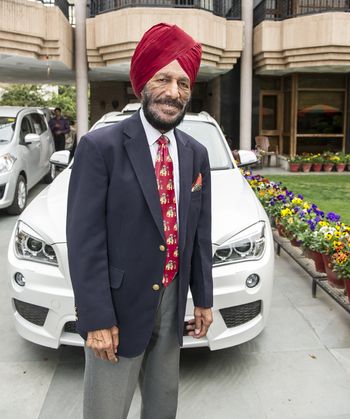I first saw Milkha Singh in 1956, at the National Athletic Championship in Patiala.
I had joined the Air Force three years earlier as a 17-year-old fresh from school, and was stationed in Ambala. During a two-day holiday, my friends and I visited the Bhakra Nangal Dam. On our way back, we stopped in Patiala to see the famous palace and the athletic championship being held at Yajuvendra Stadium.
When we entered the stadium, the victory ceremony of the 400m race was in progress. First on the podium was Alex Silvera, known as the “dark horse of the railways” and the first Indian to cover the distance in 48 seconds. Second was Milkha Singh, who was not an established athlete then. As a spectator, I never thought that I would also be standing on the podium with Milkha one day.
In December 1959, the head of my department in Ambala compelled me to take part in the 100m and 200m races in the annual sports event at the Air Force station. I did not have running shoes and had never participated in the athletics earlier. I was a fairly good cricketer, though. In an inter-school tournament, Chandu Borde—who would go on to become a famous Test cricketer—was my captain.
At the annual event in Ambala, I surprised myself and everyone else by winning the two races. The same year, I won the Air Force Championship and was selected to compete in the Services Athletic Championship at the National Stadium in Delhi in January 1960. That was the second time I saw Milkha—this time, as competitor. He was representing the Army’s Southern Command and was participating in five events—100m, 200m and 400m races, and two relays—to help his team win the championship.
I entered the 100m final, along with established names like Milkha and Makhan Singh. Milkha came first, Makhan second, and me third. I was then selected for the 4x100m relay team representing the services in the national championship.
In 1960, Milkha was hardly the rookie he was in 1956. After winning two gold medals in the 1958 Asian Games in 200m and 400m, he was consistently winning races and improving his performance. As the most talented and outstanding Indian athlete, he was looked upon as a medal prospect in the Rome Olympics that would begin in August 1960.
In the national championship, which was held in February that year, Milkha again participated in five events. He won all three individual events (100m, 200m and 400m) and helped the team win the 4x100m and 4x400m relays. In the 4x100m relay, I ran in the third leg and handed over the baton to the Flying Sikh. Though he was slow in receiving the baton, he finished the race in record time.
After the championship, Milkha was sent on a tour of Europe to participate in competitions and gain experience. He not only won several events, but also improved his performance each time, raising hopes of him becoming the first Indian athlete to win an Olympic medal in athletics. But, as luck would have it, he ended up losing the bronze by a fraction of a second.
In 1961, both Milkha and I were stationed in Delhi. Both of us practised at the National Stadium. He would arrive in a Fiat and be surrounded by athletes requesting autographs or advice. After making everyone happy, Milkha would start practising. But I could see that he no longer set his mind to it. The passion of the old days, when he would continue practising until he was forced to leave the ground, was gone.
I once asked him about his plans. He replied honestly that he had none for the next Olympics. He would be 34 by then, he said. To win a medal in 400m, one would have to clock in well below 44 seconds—a difficult target considering his age.
Milkha continued representing the services as a disciplined soldier and won the 400m at the national championship at Jalandhar in 1961. I, too, was part of the services team and won the 100m bronze.
In 1962, the services meet was held in Lucknow. It was probably Milkha’s last appearance for the Army. He again participated in five events, and won three, to help his team clinch the championship—a parting gift to the Army’s Southern Command that had groomed him as an athlete.
As a member of the Air Force team, I participated in 100m and 200m. In the 200m semi-final, Milkha and I were in the same heat. I gave it my all and came first. Milkha probably had not given his best; he came second. The press, however, played up the result. ‘Tawde pushes Milkha Singh to second place in 200m’, said a big headline.
Milkha and I had earlier qualified for the 100m final, after coming first in separate heats. A journalist came to me and said, ‘Beat Milkha tomorrow in the 100m final, and we will highlight the news on the front page.”
This put me under pressure. The race, however, started out well and I was leading till near the finish line. Just then a thought struck me for a fraction of a second: where is the great Milkha Singh? And then I saw him gain his second wind and beat me to the tape. After the race, he shook hands and said, “Well run; keep it up.”
That was the legend’s last 100m race. To be on the podium with him was something I had never dreamt of. I felt elated.
Both Milkha and I retired from service in 1962. Milkha became director of Punjab’s sports department. I was to join the Tata Group at Telco’s Jamshedpur plant, but China’s border aggression that year prompted the Air Force to call me back.
In 1963, we represented Punjab and Maharashtra, respectively, in the national championship at Jabalpur. We took on each other in the final lap of the 4x400m relay. I had a small lead when I received the baton, but Milkha soon overtook me and won gold for Punjab. Maharashtra won silver.
Though he had no passion left for competing, he dutifully represented Punjab in the 1964 national championship, too. That was his last event. I could not participate in the championship because of an injury. Milkha was selected for the 1964 Tokyo Olympics as well, but he took part only in the 4x400m relay. It was his last international event.
I met Milkha again in 1965, after I joined Telco. The occasion was the national athletic championship in Chandigarh, organised by the Punjab government. Milkha was chairman of the organising committee then, and he proved his mettle as an administrator by providing excellent lodging facilities for athletes in the MLA hostel.
I met him again in 1966, when he was chairman of the national selection committee. He said he was happy with my progress in 100m. I was selected for the Commonwealth Games in Kingston and the Asian Games in Bangkok that year. But an unexpected economic crisis forced the government to prune the size of the contingent for both the events, and I was left out.
I retired from active sports in 1971, after winning the 100m silver at the national championship in Ahmedabad. I moved on to sports administration and was elected secretary of Maharashtra’s Athletic Association in 1976. I met Milkha in 1985, and he told me that he was happy that I had taken up the task of improving sports in India.
I held several administrative posts over subsequent decades and continued to meet Milkha occasionally. He was always prompt in responding to messages and appreciating good work.
Milkha never let fame affect his appetite for hard work. Once, after recognising the need to speak English, Milkha hired a tutor to teach him the language. He was also particular about his appearance—he was always immaculately dressed.
Milkha was not just an outstanding athlete, but a thorough gentleman and caring human being. With his departure, I have lost a dear friend.





